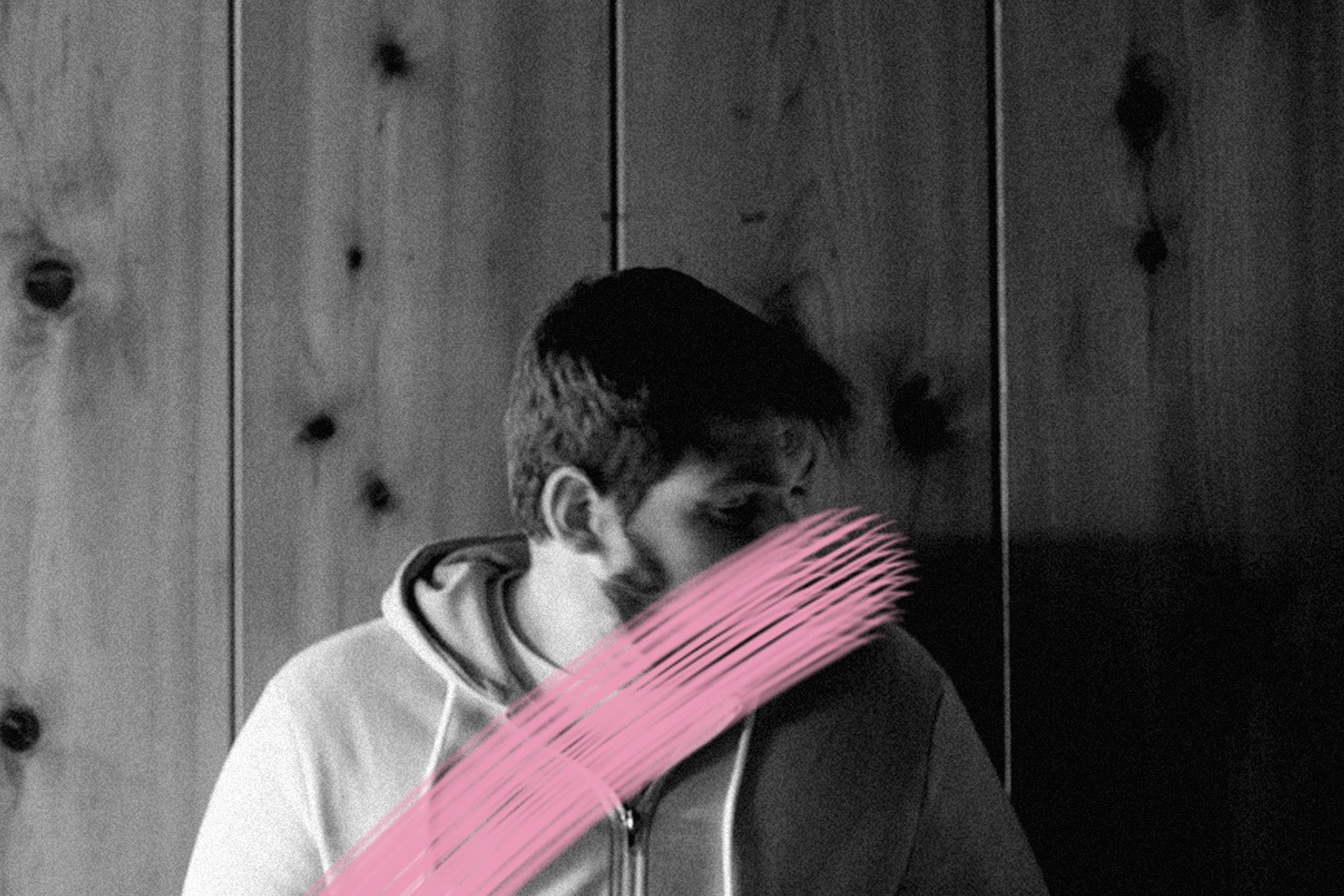Sydney Sprague’s sophomore full-length ‘somebody in hell loves you’ doubles down on the potential of her 2021 debut as she uses infectious melodies, soaring arrangements, and self-deprecating humor in putting her wry observations into a tight collection of songs.
Stream: ‘somebody in hell loves you’ – Sydney Sprague
For more time than I was ever comfortable really admitting up until relatively recently, and especially within the last few years, I have had what could easily be called a flimsy relationship with being alive. And yet, despite a feeling, or what, at times, a rather loud part of my brain is screaming at the rest of me, I continue to find myself making it through until the end of one day, and waking up into the beginning of another.
I am uncertain, as I have been for the last two years and change since I first heard the expression, if this is so much a refusal to die, but rather, a resignation I make each morning when my eyes open.
I am still here.
Despite the fact that I often do not wish to be.
And two years ago, I was unable to escape the convergence of a number of horrible things happening quite literally all at once — ultimately closing in on me to the point where I could no longer breathe. And in a moment of trying to exhale as sharply and for as long as I could, the unprecedented and attention-grabbing confidence that radiates from the opening electric guitar chords to “I Refuse to Die” rang out from the speakers within my car as it sped down a highway in St. Paul.
Alone, except for the small box of ashes that I had, for lack of knowing what else to do with them or how to safely transport them back home, buckled into the passenger seat next to me.
And two years later on, I am now much less concerned, or interested, in the kind of unabashed, “against the odds” desire to keep pushing yourself forward that singer and songwriter Sydney Sprague details in the opening track from her debut full-length album, maybe i will see you at the end of the world. At the moment, I am more interested, and concerned, and at the very least think that I have a much better understanding and respect for the kind of self-effacing anxiety and oppressive sorrow that she depicts vividly in the album’s closing, and titular track.
“I don’t know what’s going on with me lately,” she uttered in a low voice, through seemingly gritted teeth. “I just think the worst.”
I am still here.
Despite the fact that I often do not wish to be.
I just think the worst.
*
Something that has, more than likely, been the case for a majority of my music-listening existence, but is something that I have really only started to understand, or at least acknowledge more in recent years, is the difficult time I have with humor in contemporary popular music.
Because I will admit that humor can and, in many cases, does create a barrier between myself and something that I might, in fact, enjoy, if only I could learn how not to take everything so seriously—and this, of course, is advice that it might behoove me to take, and figure out how to fold it into my existence outside of listening to music as well.
I joke that “god is working on all of us,” and I find that I am still working on the comprehension that not everyone, and not everything has to be so serious all of the time. Sometimes, people do just want to have fun.
I am still working on the comprehension that not every artist or every song needs to be so serious all of the time. Sometimes, a song’s intention is to be fun, and, in turn, wants you, as a listener, to have fun as well.
And if not fun, then at least be more accepting, or appreciative, of this sense of humor, and maybe smile, even just a little, as you are able, as a means of acknowledging.
Sydney Sprague, in her songwriting, much like all of us, continues to work on both that comprehension, but finding the right balance between humor and pathos—it is a fine line that she trod with care and intelligence on maybe i will see you in moments that arrived as winking, almost sneering asides to the listener, like in the ramshackle, clattering groove of “Staircase Failure,” where she sings, “I just focus on my friends — it’s the way they walk in circles. They’re a 7 out of 10 on a scale of being difficult.”
This balance of humor and pathos, or at least the understanding of when one is needed slightly more than the other, is what Sprague brings to the songs from her second full-length, somebody in hell loves you — a collection of material that finds her doubling down on the promise, and potential, that she exuded on her debut, in terms of both the heights the melodies and instrumentation regularly ascend to, and the very obvious growth within how she uses razor-sharp wit and self-deprecating observations and reflections within her lyricism.
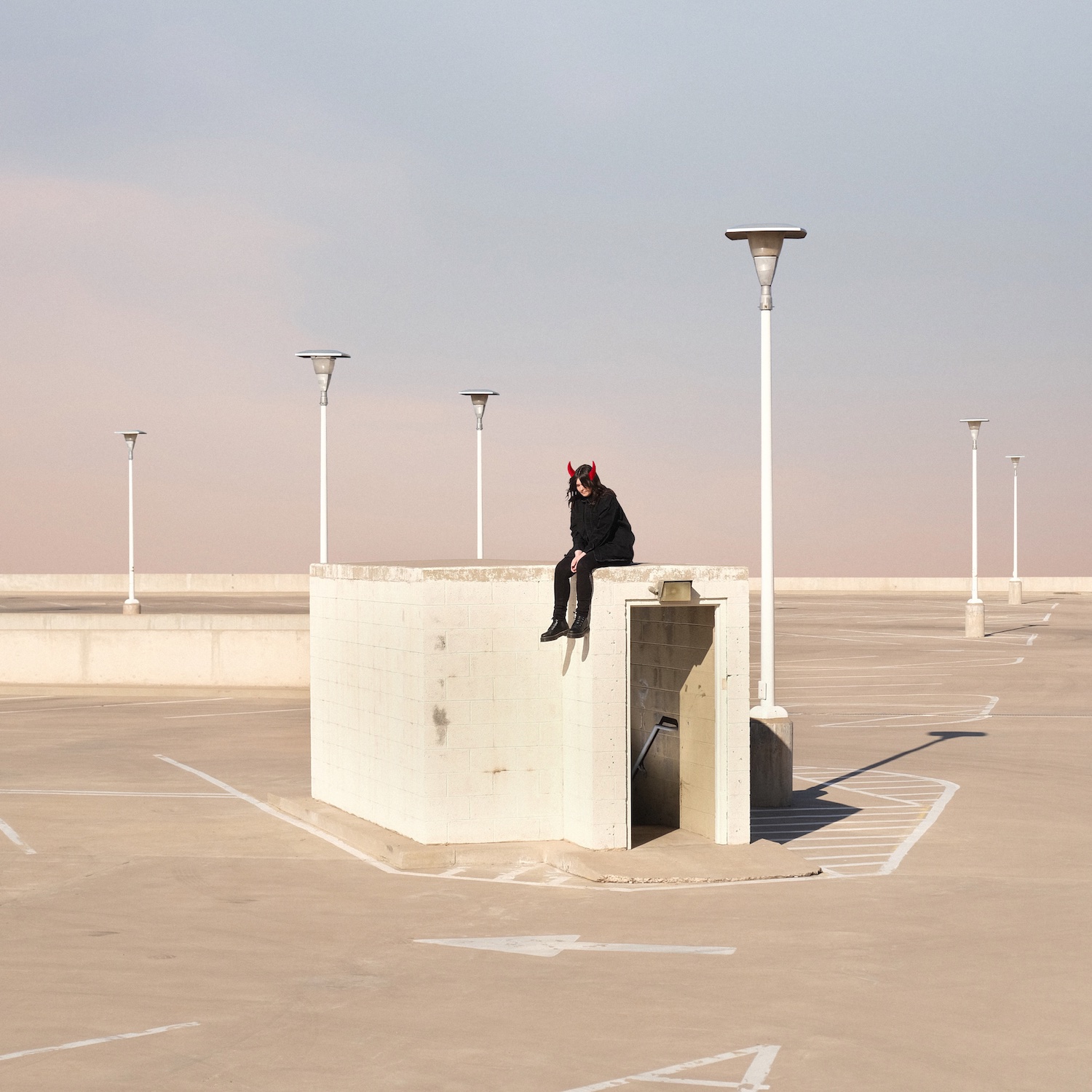
*
From the moment somebody in hell begins, it is apparent that the stakes are much higher for Sprague and her band compared to where they were in 2021 upon the release of her debut—and this makes sense.
maybe i will see you was both the result of a laborious and lengthy creative process, and an album born into uncertain times.
Sprague built a regional audience in, and around Phoenix, Arizona, in her 20s, often playing lengthy sets of covers wherever she could secure a booking, all while slowly working on her own material, and over time (and over the course of three, self-released EPs), she developed the sound that she wanted before heading into the studio in the early days of 2020 to record maybe i will see you, shortly before the upheaval that occurred within the onset of the pandemic.
By the time it was released nearly a year after it had been recorded, it was hard not to read entirely too much into a kind of eerie foreboding from song titles like “I Refuse to Die,” and “Maybe I Will See You at The End of The World”—neither of which were intended to be a reflection on what the world was like at that moment, but rather, a meditation on Sprague’s anxieties.
Releasing a record at any time, regardless of what larger and perhaps more catastrophic events are occurring, is difficult, but releasing a record during 2020, and into 2021, for artists of any size, seemed like an impossible thing simply in terms of supporting it and building any kind of momentum around it, and yourself as an artist.
Sprague, after the album’s release, found herself with a following that extended beyond the American Southwest, and in the autumn of 2021, she was selected as the supporting act on a tour with Oso Oso and The Front Bottoms, and the following year, she opened for emo icons Jimmy Eat World and Dashboard Confessional on a co-headlining run.
And it is, I think, the kind of blistering exhilaration that must come from playing live, and the kind of enthusiasm that is needed to carry the songs you’ve written from the stage, out into the ocean of people in the crowd, and have some element from them resonate, that you can hear in a bulk of somebody in hell — everything, even its more reserved moments, is much much larger in scale than it was before.
Sprague’s music since maybe i will see you is not difficult, per se, to categorize — I think I default to “guitar-driven power pop,” and hope that anyone will understand what I am talking about, and those elements are all present and accounted for on somebody in hell: It’s powerful, it’s poppy, and the guitars are still in the driver’s seat.
However, and maybe it is the time spent on the road, overall, and becoming a tighter-knit band, maybe it’s the time spent sharing the stage with bands like Jimmy Eat World and Dashboard Confessional, or maybe still, it is her work with the eclectic producer Andy D. Park and the kind of meticulous and pristine attention to detail he brought to the sessions for this album—because in the voluminous nature of how somebody ends up sounding, from the moment it begins up through its conclusion, Sprague and her band can, and often do, seemingly find themselves pivoting head first into a very early 2000s emo influenced or inspired aesthetic, which is something that, even in the nostalgia it openly operates from within, is both refreshing and inherently fun to hear.
somebody’s opening track, “if im honest,” opens with a short blast of radio static before detonating in a burst of triumphant, powerful electric guitar theatrics, pushing the album, from within seconds of it beginning, into a place of exciting pop bombast. The dust then settles when Sprague starts to deliver the song’s first, vivid, and self-effacing verse, with her voice given depth for specific lines through layers of multi-tracking. “I didn’t mean to let you down, or be cold,” she coos, leading the listener into what is ultimately not a “break up song” exactly, but more of a reflection that takes place after enough time has passed where the hurt from the loss, or separation, is still present, certainly, but perhaps not as raw, and is in a place to walk back through the emotions.
“I don’t feel anything if I’m honest,” Sprague confesses slyly in what serves as a small refrain for the song, before taking a beat and, as if looking directly into the camera, deadpans, “But I’m not,” and holds the line while all of the instrumentation underneath her drops out for just a split second, before kicking right back in, and sending the song off far into the atmosphere once again.
“if im honest” is, like “I Refuse to Die,” the kind of track one, side one that doesn’t so much “grab your attention” as it does wrap its fingers around your lapels and pulls you close, demanding that you listen, and it would be difficult, though not impossible, to sustain that kind of sheer exuberance for ten more tracks, and the fascinating dynamism that occurs as the album reveals itself is that yes, there are a number of guitar-based, or “guitar-driven” tracks on somebody in hell, but when Sprague and her band take things in that direction, they do inevitably dial down the unbridled, bouncing enthusiasm, and often place it something that is startlingly downcast and regularly thoughtful in how it is constructed in both its tone and Sprague’s writing.
The opening guitar strums of “lsob,” or “Lucky Son of A Bitch,” are both snarling, in a way, and also quite melancholic — setting the stage for the shadow that the song’s lyrical imagery casts across the arranging, as Sprague begins to unpack, as she is able, her interpersonal idiosyncrasies and anxieties, which are both recurring themes across the board on somebody in hell.
“He’s a lucky son of a bitch,” Sprague muses, the moment the song opens and the first guitar strum is heard. “He doesn’t know what he has—he doesn’t know what to do with it,” she continues. “She’s pretty—light on her feet. She’s always running around. She’s always running away from me.”
“LSOB” is one of Sprague’s most hyper-literate in terms of the detail she uses in her lyrics to depict her characters (as well as herself), but there is a vagueness, or ambiguity to how, and where, she is connected to both the man and woman introduced as her antagonists. And as the instruments slowly come together—sharp-sounding percussion, specifically, pulling it all together, it is most impressive during the slow motion bursts where Sprague howls one the album’s most impactful lyrics: “Crawl to your house just to stand outside and start at your life like it was mine.”
Things within “LSOB” become a little bleaker, or at least Sprague is a more self-deprecating in how she observes herself within the second verse. “Everybody is so fine,” she explains. “Just can’t tear away my wandering eyes, and you catch me sometimes. I still can’t tell if love is blind,” she sings quietly before the song explodes with what is less of a demand, and more of a desperate plea to an off-stage character: “Come back, and tell me what to do.”
This kind of downcast tone, and an impressive use of solid imagery woven together through an, at times, ambiguous narrative returns in the second half, on the ferocious and arresting “god, damn it jane.” The song begins in a hush of gently plucked, though crunchy-sounding electric guitar strings, before the rhythm of the drum kit comes crashing in, and Sprague begins conjuring her tale. “It doesn’t make sense to me,” she begins with a slightly pensive tone. “I get no love, I get no sympathy. Jane says I’m on the wrong side of history—I don’t think that’s true.”
Sprague, then, really wastes no time in pulling us further into the expressions of frustration and exasperation she feels with her titular friend—detailed in lines like, “Guess we’re not going after all. I punch my fist straight through to the outer wall,” and in the melodic, soaring, and smoldering chorus: “God damn it, Jane,” Sprague laments. “I just wanted a dance on Valentine’s Day, but you couldn’t hold your head up if you wanted to,” she continues, and even this fleeting, ultimately sad portrait, is still able to inject just a small amount of humor each time she returns to the chorus. “Now, how you gonna Cha Cha Slide,” she asks the first time; then, later, “How the fuck you gonna Mambo Five in your read high heels at the corner dive.”
“god, damn it jane,” as it grows, does lead up to a moment of torrential cantharis, and a final line that delivers, perhaps, the most frustration and exasperation from Sprague to Jane: “You went and turned sideways, like always.”
Sprague, throughout somebody in hell, never runs the risk of betraying the kind of pop sensibilities within her songwriting that made maybe i will see you such an infectious album from beginning to end—though the focus on huge melodies and an overall enormous sound eventually is dialed back within the last few songs here, starting with “Big Star Go,” which, musically at least, is not exactly “ominous” in how it sounds, but in moving along at a slower, more measured pace, there is something that is intentionally dark in how it sounds, and something surprisingly bleak, although brutally honest, about the observations Sprague makes in it.
“Out of all the broken birds, you’re the worst one that I’ve heard,” she begins. “You’ve got silly little problems, and I do not care about them,” she concedes in the second line of the song, before continuing with additional snark. “It’s a lot to ask of me—all your crying on my sleeve, just to hand you a solution, but I don’t have one. But if I did, I’d run away with it.”
As “Big Star Go” continues, the song grows in both the intensity of its arranging, but where it is the most jaw-dropping is how, as it is growing, and building, Sprague begins pushing her voice harder, and higher than she ever has in the past, taking it to a place that is astounding in just how large, and how visceral it becomes.
And, I suppose, similar to how Sprague uses “if im honest” as a time to reflect on what might have gone wrong or contributed to the dissolution of a relationship, she does something similar on “Big Star Go,” though the reflections she makes are much more emergent and difficult. In the second verse, she fantasizes about throwing this person’s phone out of the window of a moving car, before breathlessly mentioning the song’s antagonist is asking to “walk a tightrope on her backbone,” which is contrasted by the punchline of her saying, “But I don’t have one. But if I did, I would run away with and I wouldn’t feel so disconnected in my skin,” as her voice begins to rise to the point of desperation and frustration with the situation.
The fury and cacophony that “Big Star Go” builds to eventually resolves in its final moments—at least musically, but as is the case with a number of the narratives, or stories that Sprague details on somebody in hell, there is no right or wrong answer in the end, or any real resolution to the conflicts, which continue to hang over her, and us, as listeners, with a foreboding sense of uncertainty, which is apparent in one of last lines sung: “What a miserable mistake to ask anyone for anything.”
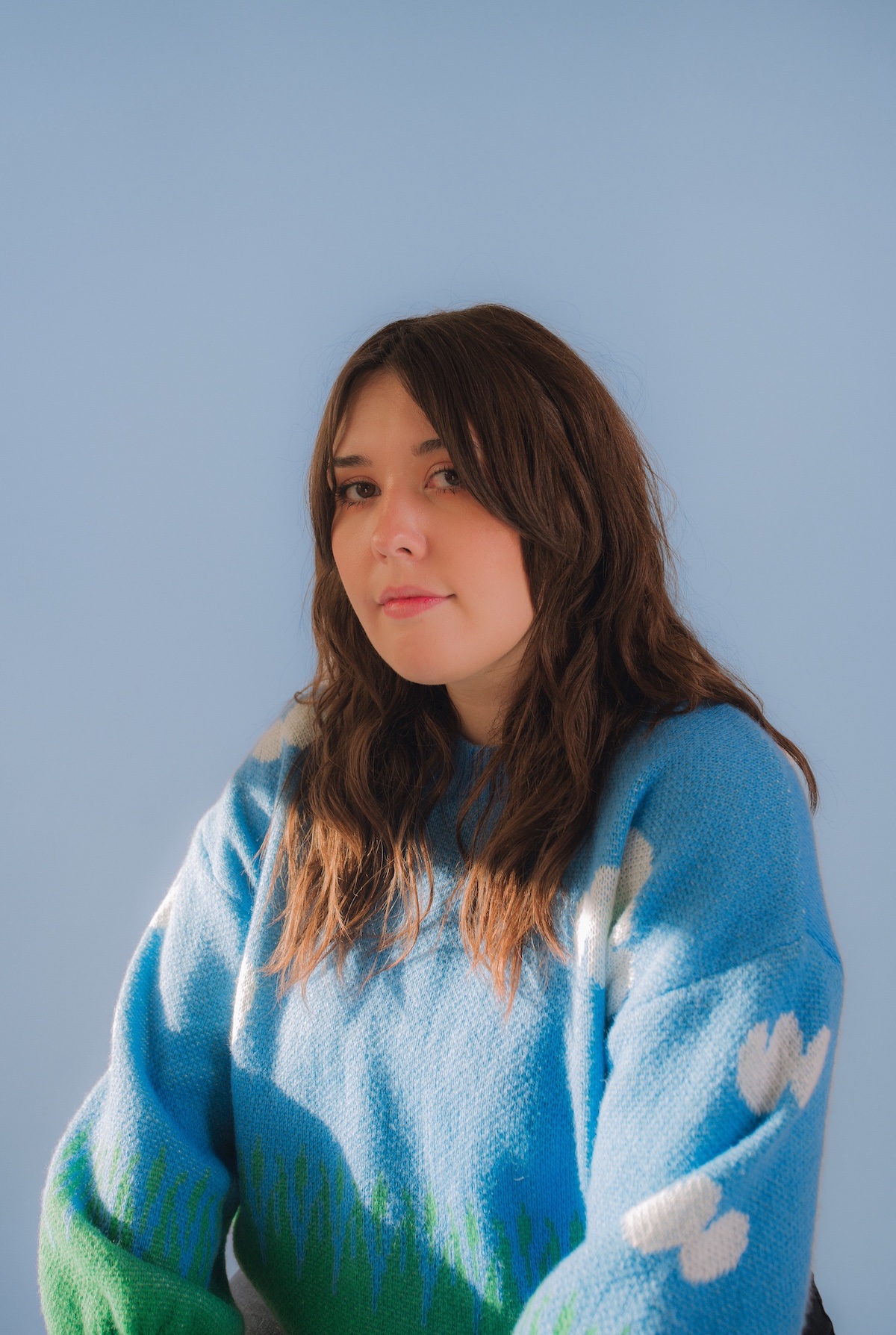
If the time on the road made Sprague and her band a tighter group, and, through that, were able to develop a much larger, or robust sound, that time also — or, perhaps just the two years that elapsed between the sessions for maybe i will see you and somebody in hell, made her more daring in the studio in terms of willing to try something new, uncharacteristic, or genuinely interesting. The result of that sense and willingness to experiment, or stray slightly from a comfort zone, can be heard in the singles released in advance of the album’s arrival in full—and like the structure, and tone, these specific songs can take, it is genuinely interesting on the part of Sprague to issue songs that are slanted in a different direction as a small glimpse into the album as a whole, showing the imaginative dynamism that courses from beginning to end on somebody in hell’s 11 tracks.
It is within these songs that Sprague shifts away slightly from the potentially emotional, or dramatic aesthetic found in a number of other places on this record, and in its place is something that I can really only describe as sounding much more whimsical, or at the very least, much more light and playful, comparatively.
somebody in hell’s second single, “overkill,” is sequenced early on in the record — placed third to provide a sort of reprieve from both the sky-high bombast of “if im honest,” and the inward and pensive turn of “lsob.” Opening with a melody played out through something wonky and heavily effected, there is also a shuffling rhythm forming underneath that tumbles everything forward to the point where Sprague’s voice comes in, and more instrumentation is added, including gentle acoustic guitar strums, snappy, skittering, clattering work percussive elements, and subtle, buzzy sounding effects swirling and writhing around just underneath it all.
The arranging and the way all of the elements tumble together gently and playfully on “Overkill” make it as bright and overtly fun as it is, but Sprague’s lyricism also plays a massive role in that feeling. Sprague, across most of the songs on somebody in hell, works less on “coming to terms” with the challenges that come from a connection to others — regardless of whether that is romantic, platonic, or perhaps unknown — and focuses more on acknowledging that these difficulties do, in fact, exist, but that there is no real answer, right or wrong, on what to do about them.
And she does spend the song’s first verse wading out into that—“You’re so pretty,” she muses in the opening line. “Take no pity — I bet you get that all the time,” “Overkill” continues, before moving into the swooning, infectious chorus, which is where Sprague does play a little more of her hand in what the conflict is within the core of the song: “When I’d die to be by yourself and to keep you standing still,” she confesses, “That’s overkill.”
And there is, of course, the dazzling sense of whimsy that drifts through “Overkill,” and that whimsy is magnified slightly through both the stream of conscious feeling of the second verse, and the sense of humor that she slyly opens it with: “Stone Cold Stunner, Homestar Runner,” Sprague sings, with just the faintest smirk. “Glitter in my eye. Hot like summer, hi-fi color—blinded by the light.”
somebody in hell’s first single, “smiley face,” tucked near the halfway point of the record, is similar — both because of the sonic risks it takes and opts to include within its fabric (the drum machine pulsating throughout its opening, for example) as well as the undeniably jaunty rhythm it maintains, and Sprague’s macabre, self-effacing phrase turns.
The pacing of “Smiley Face” clips along at such a speed to, I think, slightly distract from the spiraling that appears to be occurring in her lyrics—the same goes for the melody, and just how catchy it is—to the point where it might take a few listens through to understand the gravity of the words she’s written into a tune that does linger within your ears well after you’ve finished listening. “I’m fine. You’re fine. It’s fine,” Sprague sings breathlessly in the opening lines, before returning to a slightly amended version of the expression much later on this 77c—“I’m fine. You’re fine. Everything’s fine—even though it’s a fucked up thing to think I’d lose my conscious to you. I think I would lose everything.”
Her frantic overanalyzing, or rumination, continues, and becomes much starker, as “Smiley Face” propels itself forward. “You’re hot. And she’s hot. And I’m not,” Sprague sneers. “And I know my place, but that one thought turned into too many thoughts. I need to get my head erased.”
Throughout “Smiley Face,” coupled with the relentless rhythm, Sprague makes use of repetition of certain expressions to get her point across. There is no real chorus, exactly, to the song, though the idea that she returns to, spoken quietly as one verse comes to an end, before another begins, is bleak, once you sit with it for a little bit: “And I smile in my sleep. It’s the only time I get what I need,” before pausing. “I love that for me.”
The most difficult observation, or admission that Sprague makes in “Smiley Face” is one that appears with the final few lyrics where she is, perhaps, making strides toward that “coming to terms” with the challenges that come from interpersonal relationships, and trying to move away from the simple acknowledgment of, though, intentionally, there is no resolution in the end as she sings, “If you’re gonna come back around, you’re on your own. Baby, do you love me now? You hesitated.”
How much space can you take up inside my brain before it splits in two?
And the thing that I have, slowly, come to understand the longer I have spent with somebody in hell loves you is that it isn’t all just Sprague unpacking the specific anxieties that come from the challenges, or obstacles, of trying to connect, in whatever way, with another person, or people. I am remiss to refer to parts of the album as being “optimistic,” or even “hopeful,” so what I will say it is that there are places where it is a little less bleak—still bleak, however, and still incredibly self-deprecating in a way that can, and does, ask the listener to gaze at a somewhat unflattering reflection of themselves.
There are places where she’s unpacking the anxiety, and sitting in the challenges or obstacles, that come when that connection has actually been made, and at times, seems the connection itself is only a fraying piece of thread, attempting to hold two people together.
The most manic, and perhaps, the most relatable for some listeners, that Sprague becomes is in the final portion of the record is on “Terrible Places,” which finds her spiraling to unfathomable depths about what one person in a relationship has, perhaps more often than they should, worried about within certain moments.
Fading in slowly, over a steady, sharp-sounding drum beat and truly shimmering guitar textures, Sprague is practically breathless as she explains the kind of intrusive thoughts she has to play against. “My mind goes terrible places when you don’t answer the phone,” she begins. “And my heart’s off to the races at the end of the tone. You could be dead in a ditch—could be still as a stone. My mind goes terrible places when you leave me alone.”
Structurally, or musically, “Terrible Places” is one of the more inherently “guitar-driven” songs on the album, and without a clear or obvious chorus, there is a short, infectious melody that is noodled out on the guitar that serves in its place during an instrumental break in-between verses—the verses where Sprague’s anxieties continue to build, fearing that this off-stage character or a romantic partner has been kidnapped, drowned, or has been in a car accident.
“My mind goes terrible places when you leave me on read,” she continues midway through the song. “Maybe you’d fallen asleep—another girl in your bed. Maybe you never existed – made you up in my head. My mind goes terrible places.”
As “Terrible Places” barrels towards its explosive finale, including a guttural scream of “Oh my god,” Sprague does try, as best as she is able, to calm her anxieties through rationalities. “My mind goes terrible places, and sometimes it gets lost—trying to fill in the spaces, but my fingers are crossed. It’s just a misunderstanding. You fucking forgot. My mind goes terrible places.”
And in the album’s first half, after the glistening perk of “Overkill,” is the jittery, almost breezy shuffle of “Data Analysis,” where Sprague’s lyricism really makes its first huge turn inward, yes, but here, as she making the turn, she begins working through a very specific feeling, or moment, that I think, we as listeners might all be able to understand and recognize within ourselves—again, she holds up her own experiences, or narratives, as a mirror where we are unable to avoid catching even the faintest of traces of ourselves in.
There is an underlying obsessive nature to what is detailed in “Data Analysis” that, as the song begins, and then builds, keeps teetering between spaces of charming or endearing, and desperate or extremely unhealthy. “I wake up starving for your attention,” Sprague sings in the opening line. “Do you love me, darling? Teach me a lesson in words I can understand.”
The lyrics are delivered in a way that I hesitate to describe as “cute,” but there is a kind of bashful and flirtatious inflection in Sprague’s voice and the swaying, nonchalant nature with which she pulls the words apart by their syllables and allows them to tumble out into the rhythm at just the right time.
“I think so hard I can’t even listen, can’t believe you’d put me in this position,” she continues, leading up to the chorus. “Knees so weak I can’t stand.”
And the chorus itself happens in a kind of “blink and you miss it” instance where the momentum of the song shifts and everything sounds just a little more lush, than it does during the verses, where Sprague asks a simple question—one that we all have certainly asked ourselves at one point in our respective lives, if we’ve found ourselves in a situation similar to the one she is depicting: “How much space can you take up in my brain before it splits in two?”
And, like us, if we have found ourselves in similar situations to the one that Sprague is ruminating on in “Data Analysis,” she doesn’t exactly answer it—not directly, anyway, but in the final lines of the song, perhaps comes to the only answer, or conclusion, that she can. “It’s all fake—it’s all made up. I have no choice, but I choose you.”

*
In the opening line from the titular essay from her collection, The White Album, Joan Didion wrote, “We tell ourselves stories in order to live.”
In the final moments of somebody in hell loves you, Sprague sings, “It’s gonna be alright, kid. If it’s not, we’ll pretend like it is.”
We tell ourselves stories.
I just think the worst. I think about it all the time.
Two years ago, I was unable to escape the convergence of a number of horrible things happening quite literally all at once—ultimately closing in on me, as February turned into March, to the point where I could no longer breathe. And in a moment of trying to exhale as sharply and for as long as I could, the unprecedented and attention-grabbing confidence that radiates from the opening electric guitar chords to “I Refuse to Die” rang out from the speakers within my car as it sped down a highway in St. Paul.
Alone, except for the small box of ashes that I had, for lack of knowing what else to do with them or how to safely transport them back home, buckled into the passenger seat next to me.
For more time than I was ever comfortable really admitting up until quite recently, I have had what could easily be called a flimsy relationship with being alive, and yet despite feeling, or what, at times, a rather loud part of my brain is screaming at the rest of me, I continue to find myself making it through until the end of one day, and waking up into the beginning of another.
And I am uncertain, as I have been since the slow crawl toward spring in 2021, since I first heard the expression, if this is so much a refusal to die but rather a resignation that I make each morning when I open my eyes.
I am still here. Despite the fact that I do not wish to be.
I find now, two years later, I am far less concerned or even interested in the call to arms, or the unabashed, frenetic mission statement that opens Sprague’s full-length debut, and the desire to keep pushing yourself forward in the way she writes about.
Now, as I have been reflecting on, yes, the last two years, but also Sprague’s debut, maybe i will see you at the end of the world, about her growth as a performer and songwriter, and about who I was two years ago, and who I am now, I am still much more interested, or concerned with, or at least have a connection and an understanding and respect for the anxiety and sorrow she sings about in the album’s closing track.
“I don’t know what’s going on with me lately,” she uttered in a low voice, through seemingly gritted teeth. “I just think the worst.”
I am still here.
Despite the fact that I often do not wish to be.
I just think the worst.
We tell ourselves stories.
And there is a cacophony that Sprague swirls herself into on maybe i will see you at the end of the world – exploding into a fleeting moment of ferocity before the sudden resolve that occurs before it ends in uncertainty. She returns to that kind of uncertainty – albeit with less self-effacing anxiety, and far less fury, in the final moments of somebody in hell, with the glitchy, shimmering, and uncharacteristically gentle “Sketching Lessons.”
Opening with a bouncy, rollicking synthesizer blip that remains present underneath the other elements when they inevitably arrive, Sprague sings the first verse unaccompanied by anything else, before the confident strum of the electric guitar can be heard during the first chorus, which, by intention, clearly, creates a striking, and emotionally charged moment with how the melody and chords fold themselves into one another, coupled with the lyrics of the chorus itself.
Sprague is, as her soft, soothing voice coasts just above these elements, both intentional or direct, as well as vague with her writing in terms of what, and who, she is depicting with a surprising tenderness.
“You waited ’til the very last second, but you made it,” she sings quietly. “Know you got so bored being patient. Taking it slower than 18 wheels on an ice-cold shoulder.”
And it is in the song’s chorus – musically, it swoons in a way that is reminiscent of some of the finest and perhaps most dramatic moments and melodies from the heyday of the emo music that has ultimately inspired Sprague’s sound– where I found the conceit. Not to the record, as a whole – not really, but rather, to how I felt about this collection of songs, as an analytical listener, and what parts of Sprague’s lyricism resonated with me at this point in my life.
“It’s gonna be alright, kid,” Sprague assures us as the music around her floats in near slow motion. “If it’s not, we’ll pretend like it is.”
We tell ourselves stories in order to live.
It’s gonna be alright.
There is a juxtaposition, then, it seems, between what Sprague sings within the bridge to “Sketching Lessons,” and her original rallying cry from “I Refuse to Die.” Because in that refusal, if you do feel, for yourself, that you are refusing rather than resigning yourself, much like I have, it can become difficult to always find it within, and always keep going.
To find some small amount of optimism, or hope.
In the bridge, Sprague explains, “I pry open my eyes to see the brighter side—I set myself on fire to keep it light.”
We push ourselves, sometimes beyond where we should. We tell ourselves stories.
Maybe around a year ago, I began as gently as I could, in the moment, correcting people if their response to something I had said was “I’m sorry” – an apology when one was not needed, and, often, not wanted. “You don’t have anything to apologize for,” I would say, because they were not at fault.
Instead, I would ask that they, if they could, replace the apology with something else, maybe more genuine, or at least more accurate in what I think they were trying to convey. “I am sad to hear that,” or “I wish that weren’t the case.”
I have learned that, when someone is upset, and perhaps to the point of tears, turning into you for an embrace, the last thing they want, and the last thing you should do, is diminish their feelings by telling them that “it’s alright.” It might very well be, much later on, but within that moment when the weight of another is on your shoulder, it isn’t, and it can seem like it may never be.
“It’s gonna be alright, kid,” Sprague tries to assure us, though we know what comes next. “If it’s not, we’ll pretend like it is.” Because we do ultimately tell ourselves stories in order to live, and we push ourselves, in a refusal or a resignation, to keep going. We are still here, despite the fact that you, like me, do not often wish to be.
The final sentiment of “Sketching Lessons” can be read as hopeful, or optimistic, certainly: “A big long road, a while to go. Forever basking in the glow,” you can hear as an epilogue to the song, with Sprague’s voice faint, and run through layers of processing and effects to make it sound distant and inorganic. Hopeful and optimistic certainly, but with where it falls in the song – or, rather, what is said before it, is less so. “I pry open my eyes to see the brighter side. I set myself on fire to keep it light.”
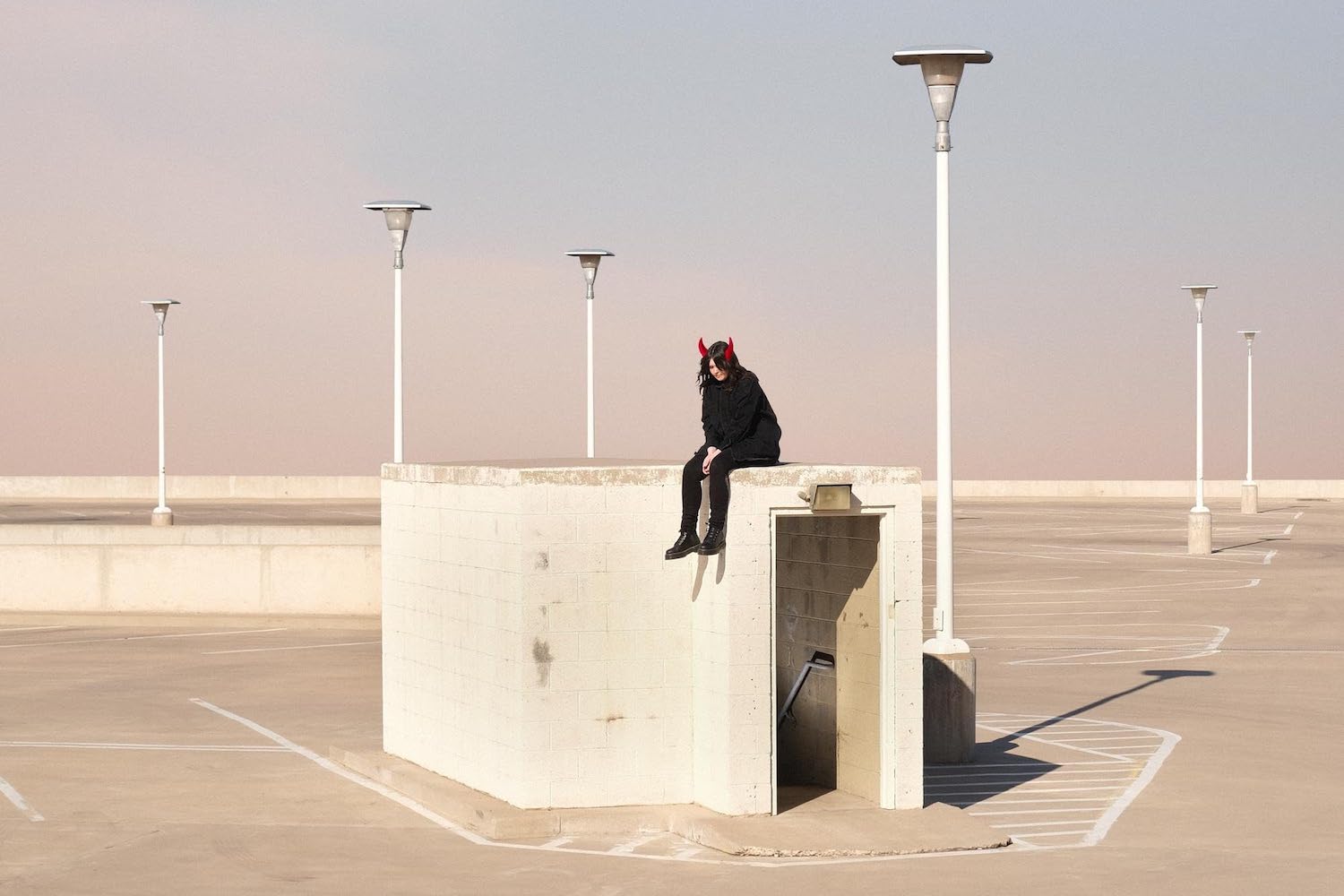
*
The glow we bask in, then, it seems, or can be, in how we push ourselves, or break ourselves, for another.
We tell ourselves stories, like it’s going to be alright. Our stories do not always have a predictable, or easy, or even happy endings.
If it isn’t alright, we pretend.
I do not know if this is still the case for Sprague, well over two years later, but the way she sang, “I just think the worst—I think about it all time,” still lingers in my ear.
Less of a refusal. A resignation. I am still here despite the fact that I often do not wish to be.
It isn’t alright. But we pretend.
*
Two years ago, when I was writing about Sydney Sprague’s debut album, maybe i will see you at the end of the world, in the end, I called it a raucous artistic statement that was both defiant and monumental. It was, and still is, a blistering, impressive debut that spoke to and accurately captured the unnerving tension of the time that it arrived into the world. somebody in hell loves you takes that raucous and monumental energy and runs with it as fast as it can—it is bold and dazzling, thought-provoking and smirking, and it is enormous in sound and scope in ways that are difficult to truly articulate.
The promise, or the potential, found within a debut can be a challenge to live up to, or make good on, but Sprague has crafted a tight, lean, poignant, honest, snarky, and infectious sophomore album that shows the intelligence and the growth she has experienced as a songwriter.
— —
:: stream/purchase somebody in hell loves you here ::
:: connect with Sydney Sprague here ::
— — — —

Connect to Sydney Sprague on
Facebook, Twitter, Instagram
Discover new music on Atwood Magazine
© 2023
:: Stream Sydney Sprague ::

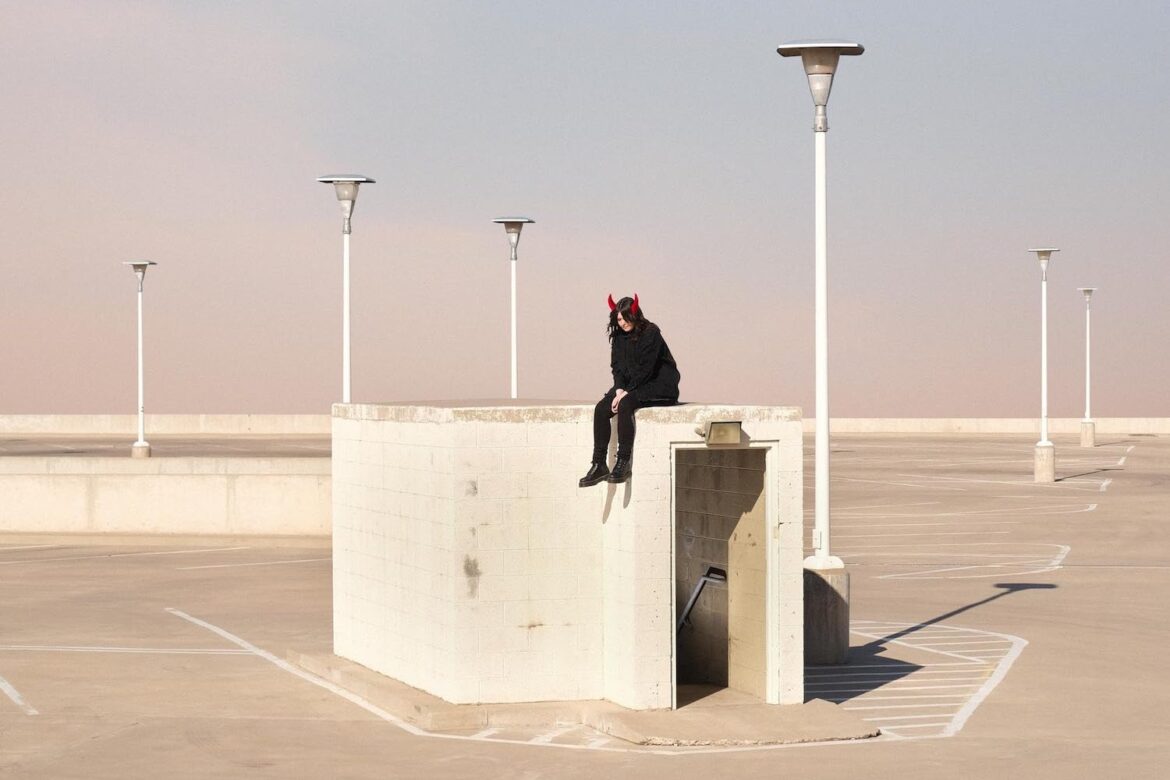
 © 2023
© 2023


